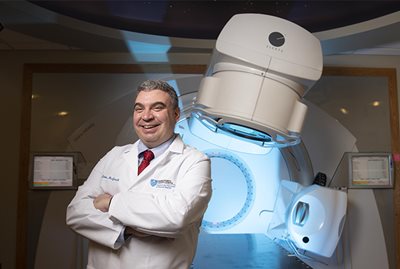Emerson Hospital’s breast cancer services are provided through the collaboration of the hospital’s
Hermel Breast Health Center and
Mass General Cancer Center at Emerson Hospital — Bethke, which combines expert diagnostic and cancer specialists with state-of-the-art technology in a convenient, comfortable setting close to home and family.
Treatment at the Cancer Center: Complete, Convenient and Personalized
Routinely, experts from the area’s leading institutions meet with the center’s oncologists to
discuss specific patient cases. The
extended team at Emerson includes the full spectrum of support services: social workers, nutritionists, physical therapists, home care and pain management specialists, and integrative therapy practitioners. At the Cancer Center, patients have easy access to their physicians and other providers during and after treatment, all in the comfort of a community setting.
Medical Oncology
Emerson’s experienced
medical oncologists specialize in the medical treatment of breast cancer. They help guide the diagnosis, treatment plan and overall care for patients. Medical oncologists prescribe chemotherapy, hormone therapy and/or biotherapy for patients who require it. The Cancer Center’s medical oncologists have close working relationships with colleagues at Mass General Cancer Center in Boston. Emerson patients have access to the latest treatments available through cancer clinical trials.
Chemotherapy and Infusion Services
Chemotherapy is an important part of many cancer treatment plans. Advances in chemotherapy treatment are making this therapy more precise and targeted. The Cancer Center’s outpatient chemotherapy infusion suite offers the most advanced therapy in a new, state-of-the-art facility staffed by medical oncologists and specially-trained oncology nurses.
In addition, patients admitted to Emerson Hospital have access to the
Naka Infusion Center, which provides a suite dedicated to infusion therapies designed with patient safety, comfort and privacy in mind. Family members or friends are welcome to accompany patients during treatment.
Clinical Trials
Over the past 15 years, clinical trials have been an important part of our comprehensive cancer program. A clinical trial is a study of volunteer patients that answers questions about the most effective ways to treat a condition. Every treatment for breast cancer that is currently available first went through a clinical trial. When a patient is enrolled in a clinical trial, they are watched closely by the trial contact for treatment effects. Close surveillance includes phone calls, physical examinations, blood tests and possible imaging tests. A patient who enrolls in a clinical trial may withdraw at any time and resume treatment with standard therapy.
Deciding to participate in a clinical trial is a very personal decision. Your medical oncologist is the best place to start when looking for more information about clinical trials. Other resources include:
- National Institutes of Health (NIH) — clinicaltrials.gov
- American Cancer Society — Contact a clinical trials specialist at 800-303-5691.
Radiation Therapy
Radiation therapy is an invaluable cancer-fighting therapy and is usually given once a day over many weeks, so convenience and ease-of-access to the treatment facility is critical. The Massachusetts General Hospital Department of Radiation Oncology at Emerson Hospital provides all of this. The joint program includes the most up-to-date and highly-accurate treatment and planning technologies available at the major downtown hospitals in one convenient location — at the Mass General Cancer Center at Emerson Hospital — Bethke in Concord, Mass.

Recent advances in radiation treatment which are available to Emerson patients include:
- 3-D Conformal Radiation Therapy — CT-scan guided treatment planning, which enables the physicians to pinpoint the precise tumor location using an on-site CT scan.
- Intensity-modulated radiotherapy (IMRT) so the physicians and physicists can "sculpt" radiation beams around the tumor, thus avoiding unnecessary radiation to normal tissues and structures.
- Image-Guided Radiation Therapy — Imaging tools within the linear accelerator (treatment machine, pictured above with radiation oncologist John McGrath, MD) that enable precise re-positioning of the patient from one treatment session to the next.

